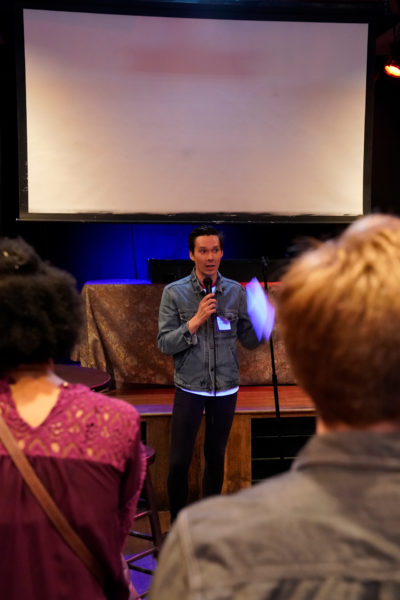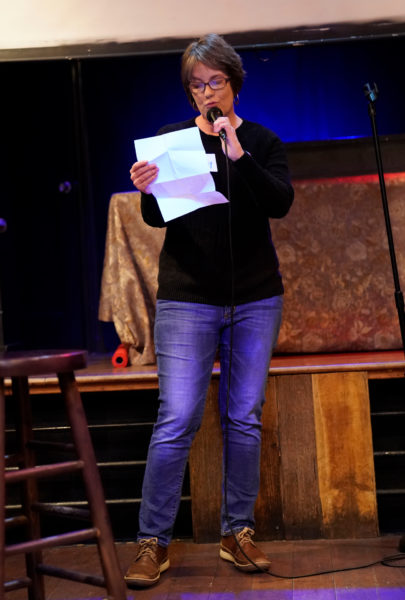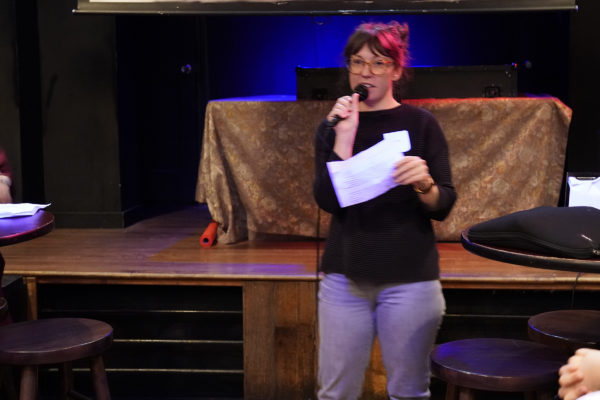The Importance of Solidarity Between Faculty Across Institutions
April 7, 2019

Hello, my name’s Daniel Pieczkolon, and I’m an adjunct in the English Department at Arcadia University where we’ve been negotiating our first contract with United Academics of Philadelphia for the past 19 months. And I’m here to say “thank you” (and good luck) to TAUP.
As we’ve navigated the processes of first forming a union and now negotiating our first contract at Arcadia, we’ve looked to Temple for support, and you all have provided it–both conceptually and practically.
Conceptually, we were able to look to your most recent contract for policies and concepts and bring them to our negotiations (buttressed by the argument of precedent). In doing so, we’ve won a Course Cancellation policy that nearly mirrors–save for where it improves upon–the policy you won; we’ve been able to significantly increase our minimum per-credit wages in the hopes of one day achieving parity with full-time instructors (a goal I know you, too, are working toward).
Beyond serving as a model, TAUP has–in a very literal way–provided us with support as well. Members from your union have sent us solidarity photos, attended our rallies, and championed our cause on social media. At Arcadia, we’ve engaged in open bargaining, as I know you are getting ready to do. For our first negotiating session of the Fall 2018 semester, we tried to pack the room with as many people as we could, calling upon Arcadia faculty and students and professors from across the city to come. TAUP sent three of its representatives–Jennie Shanker, Zoe Cohen, and Sarah Heyward–to bear witness to our negotiating process. And we couldn’t be more grateful. At its core, the idea of a union is to leverage the power of the many to influence the powerful few. And this notion of power via collectivism expands beyond our individual institutions. Together, we make up the professoriate of Philadelphia, and when we work together, we have the power to redefine our working conditions (certainly through formal avenues such as contract negotiation, but also through informal avenues–in essence using the logic of the market to force universities and colleges to treat faculty, regardless of their status as a unionized or non-unionized institution, better).
Last Wednesday March 6th, we received a revised Last Best Final Offer. (A quick aside, we received a Final Offer in November, a Last Best Final Offer in January, and now a revised Last Best Final Offer in March. As you get set to begin your negotiations, remember that the process is over when you deem administration’s offer fair and not a moment sooner). In the revised Last Best Final Offer, we’ve made incredible gains, including Academic Year Appointments for adjuncts; the presumption of renewal from semester to semester so that our most senior adjuncts can not only be rehired each semester (as some of them have been for decades), but actually get to experience the stability that comes with that kind of sustained employment; a professional development fund specifically dedicated to adjuncts; raises for nearly every single adjunct and significant increases for our lowest paid works; and improved access to healthcare.
We couldn’t have done this without TAUP, and I can’t tell you how excited I am that you are all returning to the table. We just proved at Arcadia that your wins at Temple ripple across the city, and we’re excited for this process to continue. Each time a faculty union in Philadelphia wins a contract, it raises the standards of working conditions across the city.
Thank you and good luck.
Mary Stricker: Recognizing our Humanity
March 25, 2019

My name is Mary Stricker and I am a recently elected NTT Constituency Council member and a TAUP Department Organizer in Sociology.
As a Teaching/Instructional faculty member for almost 18 years, getting a contract that fairly rewards our work and our time is very important to me as it is to all of us here. But getting a good contract that recognizes all of our humanity and all of our dignity—including that of our students, is crucial. And it is this humanity and this dignity that has been front and center in all of the labor actions and victories, including here at CCP and Arcadia, that we have seen recently around the country, workers coming together to demand not only that they receive salaries that fairly reward them for their work but that they be seen as workers who are also moms and dads, and sons and daughters, social beings with emotions, interests outside of work, complicated lives–some of us getting older, and some of us just getting settled into adulthood. And as these full humans we need not only fair compensation but we need access to quality and affordable childcare for our little ones, quality and affordable college opportunities for our big ones, quality and affordable health care and retirement plans for ourselves and our families.
And we deserve for our employer to recognize that our work is not separate from our humanity nor our students’ humanity—that we are not simply cogs in the Temple machine or the CCP machine, or the Arcadia machine—that thanks to our hard work we should know that will still have a job next semester, next year, the next decade– so that we can allow ourselves to breathe, do our jobs well, AND be human. We need to know that student evaluations, which have been shown again and again to be biased against faculty of color and women faculty, will not determine our fates. We need to know that thanks to our hard work we will be rewarded with promotions—not at the whim of a chairperson, but through a transparent system that is accessible to all of us. And finally, We need to know that the University is committed to its students, its staff, and its faculty through investment in research and investment in teaching and investment in our humanity– not investment in football stadiums.
I look forward to working with everyone on this contract, and in other struggles at CCP, Arcadia, and beyond, to create a better and more human society for all of us.
Leanne Finnigan on Parental Leave
March 13, 2019

I am Leanne Finnigan, a librarian at Paley library – soon to be the Charles library. I am also a single mother to a fantastic two year old. I wanted to share with you what TAUP and securing a strong contract would mean for me. As many of my colleagues here know, I am always happy talk about that.
Librarians have no paid parental leave beyond sick and vacation time, and even our use of this earned time is limited. Our vacation and personal time does not carry over beyond the fiscal year, so there’s no way to horde time even if a pregnancy is planned far in advance (though no one should be expected to plan in advance). Temple also needed to know how my daughter exited my body in order to determine how much sick leave I could use, since a maximum of eight weeks can be taken depending on the type of delivery. Because of these limitations, unless we save every vacation and personal day we earn and give birth during a particular window of the fiscal year, it is impossible to have enough paid time to cover a 12 week leave. Having to figure out Temple’s opaque leave policies and piece together all the moving parts feels like a punishment for being pregnant.
We can apply for an unpaid leave of absence if we choose to take leave beyond what is granted under FMLA. But at that point Temple’s cost sharing for medical coverage ends until we return. So in addition to lost wages, we are on the hook for 100% of our premiums during a time when our families are medically vulnerable. This feels like a punishment for taking time to bond and heal, to establish breastfeeding and avoid relying on expensive childcare.
Speaking of childcare… As a librarian, I am subject to Temple’s patronizing leave policy that says if I use more than five sick days in a fiscal year, regardless of how many days I’ve earned, I am violating the university’s work rules and am subject to formal discipline. *Five sick days in a year.* A policy that begins with the assumption that I am incapable of using my earned sick leave judiciously is patronizing and disrespectful. As a single mother, adhering to that policy is also unrealistic without some provisions for childcare. Securing benefits such as subsidized backup care in our next contract would have an immediate and profound effect for me and other TAUP members. That includes those of us caring for children and for other members of our families. The conversations we had at the childcare symposium organized by Marsha and the childcare committee made that very clear.
Parental leave and care benefits affect us all, even those who do not need them. We are a pretty tight-knit group in the library. Teamwork and collaboration are values woven into our mission and operating principles. My absence and well-being matter, and the same can be said for my colleagues. It is for these reasons that I am willing to fight for a strong contract, and why I encourage each of you to come to open bargaining sessions and continue to be involved in our union!
